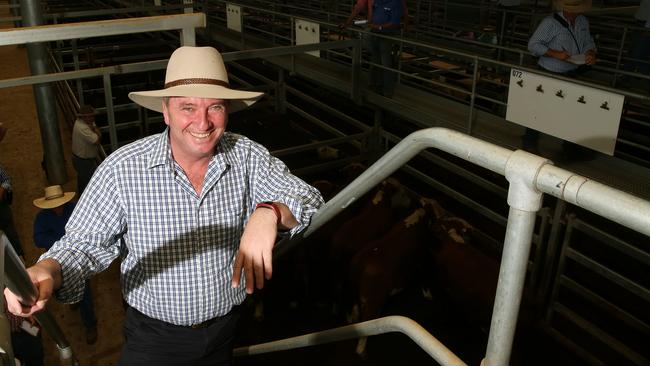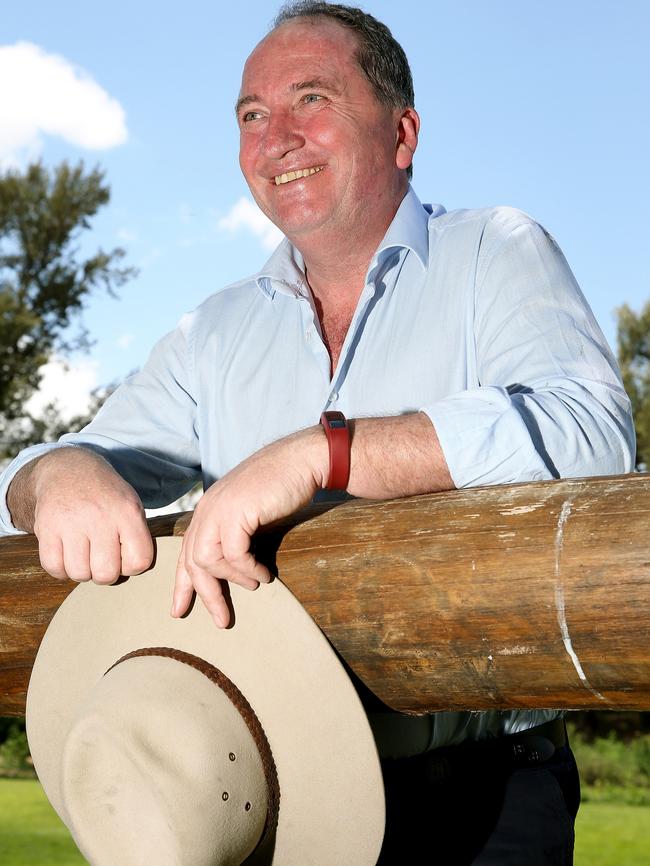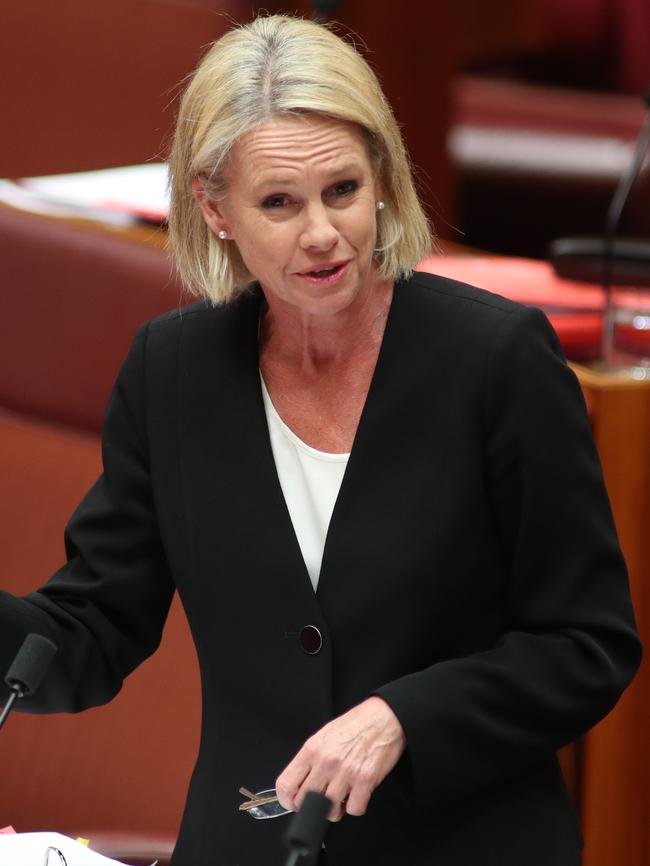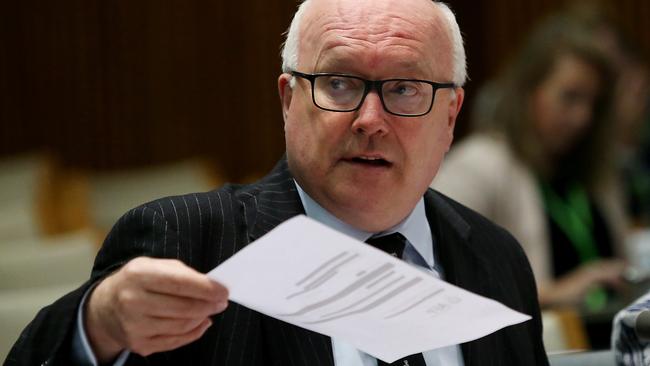Union targets ineligible Barnaby Joyce and Fiona Nash over their votes on penalty rates
BARNABY Joyce has dared Labor to “go right ahead” and challenge dozens of ministerial decisions he made when ineligible to sit in Parliament, suggesting that move would only increase support for the Coalition.
NSW
Don't miss out on the headlines from NSW. Followed categories will be added to My News.
BARNABY Joyce has dared Labor to “go right ahead” and challenge dozens of ministerial decisions he made when ineligible to sit in Parliament, suggesting that move would only increase support for the Coalition.
“The ones they want to reverse are the ones that help regional Australia, and as the Labor Party goes to an election in Queensland, this is your Labor Party fellas — it doesn’t look after regional people,” Mr Joyce said.
“If the Labor Party want to challenge a whole heap of decisions to make poor people poorer and to show they have absolutely no vision of regional Australia, go right ahead fellas because we have got the Queensland election on and we will be reminding everybody about how completely and utterly out of place you are with regional Australia.”

Legal advice obtained by Labor over the weekend concludes it is highly likely there will be a challenge to decisions made by Mr Joyce and former Nationals deputy leader Fiona Nash.
But it is unlikely it will be Labor who will pursue any legal challenge, with party insiders suggesting it could be financially aggrieved third parties like water irrigators.
It come as a bitterly fought battle over penalty rate cuts for thousands of workers could be set to start again as unions target the votes and decisions of booted Nationals MPs Barnaby Joyce and Fiona Nash.
Australian Council of Trade Unions boss Sally McManus confirmed to The Daily Telegraph that legal advice was being sought about whether unions could challenge Mr Joyce’s “illegitimate votes” against a reversal of the February penalty rate cuts.


Separate legal advice to be publicly released by Labor today states that the likelihood of challenges against decisions made by the two former senior Nationals “is high”.
That could wreak havoc on the government as it prepares to fight a crucial by-election in Mr Joyce’s seat of New England in early December.
READ MORE
► DAILY TELEGRAPH EDITORIAL: UNIONS SEEKING TO EXPLOIT HIGH COURT DECISION
► LABOR SHAPES TO CHALLENGE DECISIONS OF REELING GOVERNMENT
Mr Joyce, Ms Nash and three others were deemed ineligible to have held office by the High Court on Friday because they were dual citizens when elected.
“We are keenly aware that Mr Joyce illegitimately sat in Parliament, debated and voted to cut penalty rates,” Ms McManus said.
“This decision gave the government the one vote it needed to cut the wages of 700,000 retail, pharmacy and hospitality workers.”
But Attorney-General George Brandis yesterday played down the impact of the High Court decision, and said there were “no legal consequences here at all”.
“There is no issue at all because the court will not go behind a vote of the Parliament,” Senator Brandis said.
While the Fair Work Commission made the decision to cut Sunday rates, the government only won a vote against reversing that decision in June by one vote after Nationals MP George Christensen crossed the floor on the issue.
“If Barnaby Joyce hadn’t cast illegitimate votes, those cuts would not be happening,” Ms McManus said.
“The Australian people deserve to know if there is a way to undo that unjust and illegitimate outcome now.”
Legal advice prepared for Labor by prominent Melbourne silks Matthew Collins QC and Matthew Albert QC states: “Our view is that any decisions made by Joyce and Nash, purportedly in their capacity as Ministers, on and after 20 October 2016 (the date three months and one day after being sworn in as Ministers on 19 July 2016), are open to challenge.”

The reference to the three-month period involves section 64 of the Constitution, which allows a minister to hold office for as long as three months without being elected to Parliament.
“Such decisions could be challenged on the basis that they are invalid, because the person making the decision was not constitutionally able to hold office as a Minister at the relevant time and therefore lacked power to make the decision,” they write.
“It is not difficult to envisage challenges being brought in respect of decisions that have had significant financial, environmental or other repercussions by corporations or persons with interests in reversing those decisions.”
It is unclear but unlikely that this extends to the rare situations where the government won a vote in the House of Representatives by a single vote.
Labor sources said they did not expect the party would challenge any decisions made by Mr Joyce or Ms Nash, but other affected parties might do so — particularly as Mr Joyce has made numerous decisions about water rights, as well as funding decisions for the agricultural sector.

However, Manager of Opposition Business Tony Burke yesterday confirmed Labor was combing through decisions that were taken by Mr Joyce, saying there was a “whole lot of legal doubt” over them.
Senator Brandis said the government was also looking carefully at this.
“Most decisions that ministers make are in fact made by the Cabinet on the recommendation of ministers,” he said.
“Appointments are made by the Governor-General or the federal Executive Council on the recommendation of ministers.
“Of course the Labor Party will be trying to play games because they do not have an interest in a steady government for the country.”
Parliamentary Library research to be released today shows Mr Joyce made at least 20 legislative decisions and Ms Nash made at least eight that could be subject to challenge.


